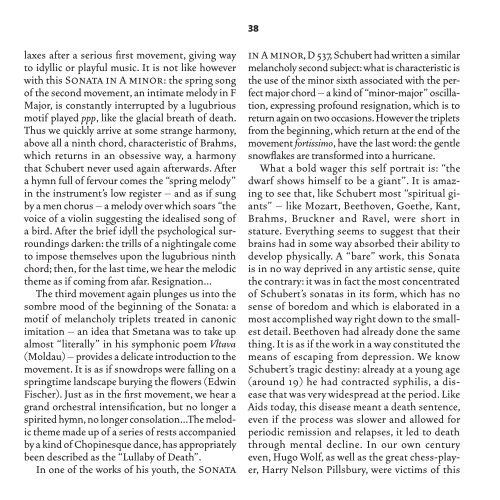Télécharger le livret - Outhere
Télécharger le livret - Outhere
Télécharger le livret - Outhere
Create successful ePaper yourself
Turn your PDF publications into a flip-book with our unique Google optimized e-Paper software.
laxes after a serious first movement, giving way<br />
to idyllic or playful music. it is not like however<br />
with this Sonata in A minor: the spring song<br />
of the second movement, an intimate melody in F<br />
Major, is constantly interrupted by a lugubrious<br />
motif played ppp, like the glacial breath of death.<br />
Thus we quickly arrive at some strange harmony,<br />
above all a ninth chord, characteristic of Brahms,<br />
which returns in an obsessive way, a harmony<br />
that Schubert never used again afterwards. After<br />
a hymn full of fervour comes the “spring melody”<br />
in the instrument’s low register – and as if sung<br />
by a men chorus – a melody over which soars “the<br />
voice of a violin suggesting the idealised song of<br />
a bird. After the brief idyll the psychological surroundings<br />
darken: the trills of a nightinga<strong>le</strong> come<br />
to impose themselves upon the lugubrious ninth<br />
chord; then, for the last time, we hear the melodic<br />
theme as if coming from afar. Resignation…<br />
The third movement again plunges us into the<br />
sombre mood of the beginning of the Sonata: a<br />
motif of melancholy trip<strong>le</strong>ts treated in canonic<br />
imitation – an idea that Smetana was to take up<br />
almost “literally” in his symphonic poem Vltava<br />
(Moldau) – provides a delicate introduction to the<br />
movement. it is as if snowdrops were falling on a<br />
springtime landscape burying the flowers (Edwin<br />
Fischer). Just as in the first movement, we hear a<br />
grand orchestral intensification, but no longer a<br />
spirited hymn, no longer consolation…The melodic<br />
theme made up of a series of rests accompanied<br />
by a kind of Chopinesque dance, has appropriately<br />
been described as the “Lullaby of Death”.<br />
in one of the works of his youth, the Sonata<br />
38<br />
in A minor, D 537, Schubert had written a similar<br />
melancholy second subject: what is characteristic is<br />
the use of the minor sixth associated with the perfect<br />
major chord – a kind of “minor-major” oscillation,<br />
expressing profound resignation, which is to<br />
return again on two occasions. However the trip<strong>le</strong>ts<br />
from the beginning, which return at the end of the<br />
movement fortissimo, have the last word: the gent<strong>le</strong><br />
snowflakes are transformed into a hurricane.<br />
What a bold wager this self portrait is: “the<br />
dwarf shows himself to be a giant”. it is amazing<br />
to see that, like Schubert most “spiritual giants”<br />
– like Mozart, Beethoven, Goethe, Kant,<br />
Brahms, Bruckner and Ravel, were short in<br />
stature. Everything seems to suggest that their<br />
brains had in some way absorbed their ability to<br />
develop physically. A “bare” work, this Sonata<br />
is in no way deprived in any artistic sense, quite<br />
the contrary: it was in fact the most concentrated<br />
of Schubert’s sonatas in its form, which has no<br />
sense of boredom and which is elaborated in a<br />
most accomplished way right down to the smal<strong>le</strong>st<br />
detail. Beethoven had already done the same<br />
thing. it is as if the work in a way constituted the<br />
means of escaping from depression. We know<br />
Schubert’s tragic destiny: already at a young age<br />
(around 19) he had contracted syphilis, a disease<br />
that was very widespread at the period. Like<br />
Aids today, this disease meant a death sentence,<br />
even if the process was slower and allowed for<br />
periodic remission and relapses, it <strong>le</strong>d to death<br />
through mental decline. in our own century<br />
even, Hugo Wolf, as well as the great chess-player,<br />
Harry Nelson Pillsbury, were victims of this


